News by audience
- Current students (3)
- Future students (2)
- Faculty (3)
- Staff (3)
News archive
You likely know that University of Waterloo is a global leader in the United Nation's HeForShe campaign, but did you know we’ve had a legacy of women’s studies dating back to our earliest years?
This June, University of Waterloo Library’s Special Collections & Archives (SC&A) is celebrating the 50th anniversary of receiving the Lady Aberdeen Collection. This library of early feminist works laid the groundwork for Waterloo Library to be a nucleus of women’s studies across Canada, and are now some of the most-used items in the Library's Archives.
Ishbel Maria Marjoribanks Hamilton-Gordon, known as Lady Aberdeen, was born in 1857, and married the first Marquis of Aberdeen in 1877. Both were social reformers ahead of their time, and Lady Aberdeen’s entire adult life was dedicated to philanthropy in the United Kingdom and Canada. Following a visit to Canada in 1890, Lady Aberdeen founded the Lady Aberdeen Association for Distribution of Literature to Settlers in the West, which sent literature to isolated Prairie households. Lord Aberdeen was Governor-General of Canada from 1893-1898, and despite their return to the United Kingdom, Lady Aberdeen would say before her death many years later that “I have been a Canadian for many years. I shall always be a Canadian.”
Lady Aberdeen was the first woman to receive an honorary degree in Canada, and the first to deliver a speech to the House of Commons. She played a key role in establishing the Victorian Order of Nurses (VON), and helped found the National Council of Women of Canada (NCWC), a non-partisan federation of women’s organizations with a goal of social reform and suffrage.
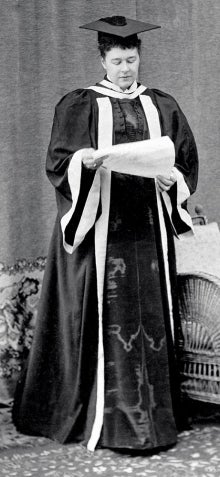
Lady Aberdeen receiving an honorary degree, 1897. [Photo from Queen's University]
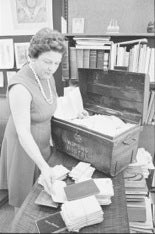
Doris Lewis, University of Waterloo's first Librarian, unpacking the Lady Aberdeen collection.
In 1954, the NCWC's Arts and Letters Committee began to assemble a library of material by, and about, women. Named in honour of Lady Aberdeen, the council’s first president, the collection of books grew to include periodicals, government documents, pamphlets, clippings, manuscripts, ephemera and realia. The collection is particularly strong in literary and biographical works by and about Council members.
The Lady Aberdeen Library on the History of Women, known as the Lady Aberdeen Collection, was donated to the University of Waterloo Library in 1967 to mark the occasion of the Centennial of Canadian Confederation.
Lady Aberdeen’s influence at University of Waterloo did not stop there – her legacy continues on in Women’s Studies students today. Since the fall of 2015, there has been an evolving collaboration between Women’s Studies and Special Collections & Archives.
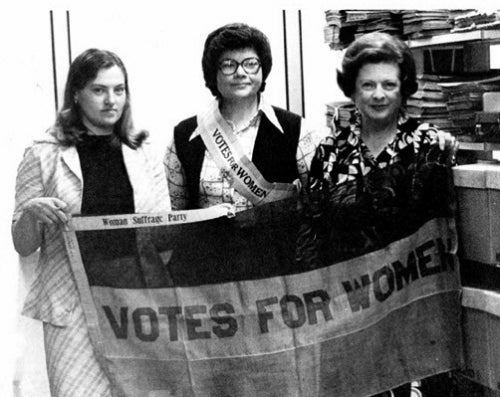
Library staff members Adelhaid Bender, Carolyn Presser and Doris Lewis displaying suffragette materials from the Lady Aberdeen Collection, 1967. [Photo from Special Collections & Archives]
In the process of redesigning the Women’s Studies 101 course, Professor Trevor Holmes sought to provide students with hands-on research experience. With a background in queer and feminist theory, and years of doing teaching development work at Waterloo’s Centre for Teaching Excellence, he knows how powerful it can be to get students out of the lecture hall and into other spaces relevant to their learning.
In meeting Librarian Jessica Blackwell, he found someone equally as passionate about students working with archive material.
“Once I met Jessica, it was clear that we’d have some synergies. We both want students to have material connections that make course content come alive. I knew we had some collections of importance at Waterloo, and I was thrilled to learn more about the history of these archives and of Women’s Studies at Waterloo. Our collections here at Waterloo are quite relevant to Women’s Studies 101.”
The curriculum for the course now calls upon students to transcribe suffragette diaries from the Lady Aberdeen collection. Holmes explains that students benefit in many ways from the transcription exercise:
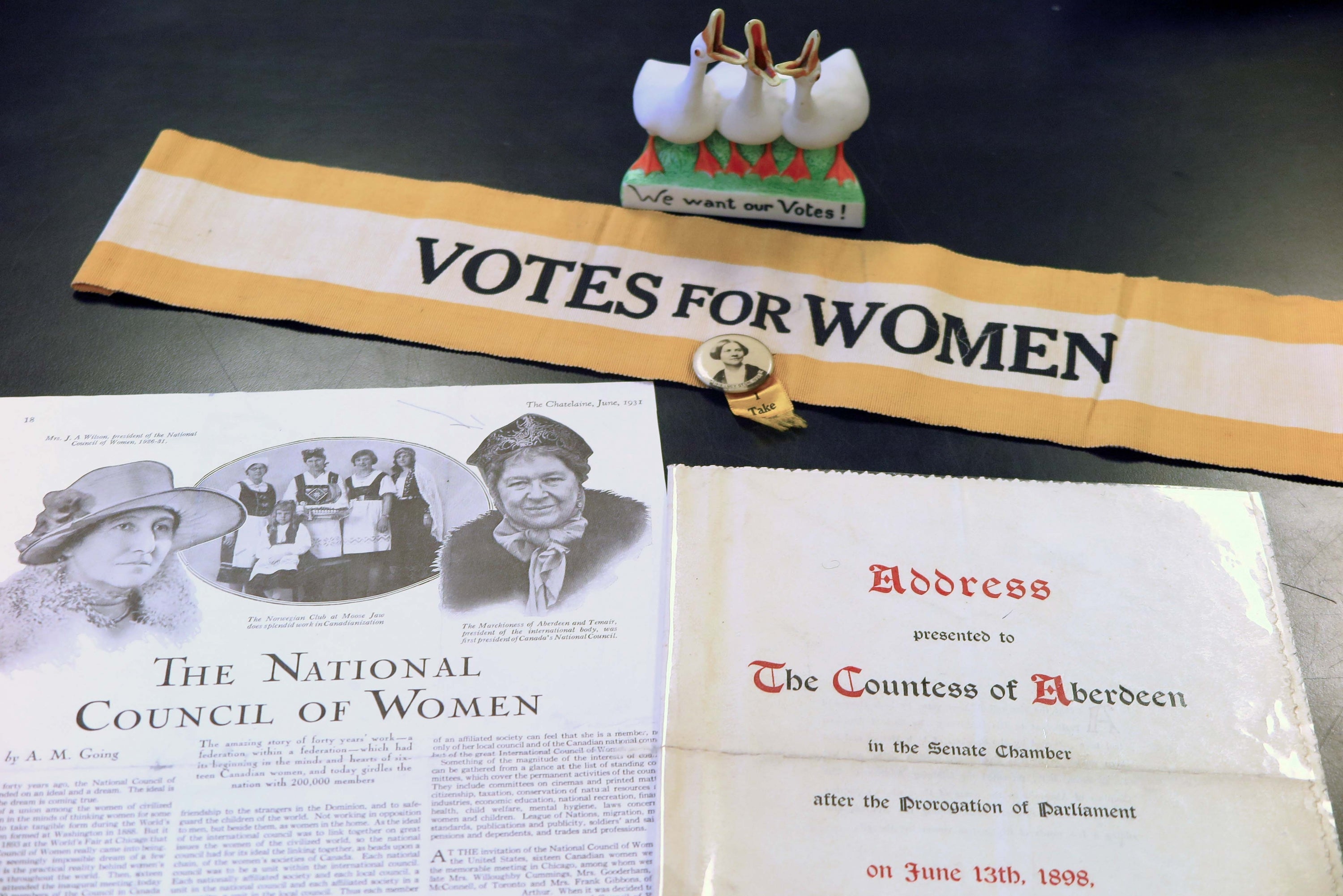
Items form the Lady Aberdeen Collection, from top: Porcelain geese figurine [19--], Breast banner: Votes for Women [191-], The National Council of Women by A.M. Going [1931], Address presented to The Countess of Aberdeen in the Senate Chamber after the prorogation of Parliament [1898].
"It makes a period in history come alive in ways that reading about it doesn’t."
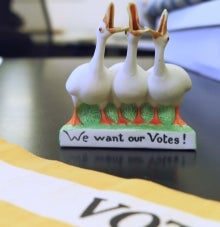
Not everyone was in favour of suffrage; this bud vase was a piece of anti-suffrage propaganda.
"It makes a period in history come alive in ways that reading about it doesn’t. By retracing the geopolitical and conceptual steps taken by Alice Riggs Hunt, for example, they get a sense that rights can’t be taken for granted, and that not only women were interested in enfranchisement for women - nor were all women in favour of it. They see a discourse on sex and race as it was really lived in the moment. They learn that they can tackle a task they thought would be impossible and achieve perfection or nearly so."
He also notes that they learn the protocols of conventional transcription much earlier than most academics ever do, and contribute something to the public good by transcribing things that previously were not available digitally for all to study.
The impacts of this collaboration have gone far beyond coursework, with some students expressing that the exercise helped them feel like they were connecting to a wider world, and other students having the opportunity to co-present with Holmes and Blackwell at a teaching-related conference.
Student Olivia Carvalho carried the experience over into a fine arts course, creating art inspired by Alice Riggs Hunt. That art was featured in one of the most popular exhibits ever hosted by SC&A, The New Feminists, subsequently featured in the Imprint and exhibited at the Office of the President.
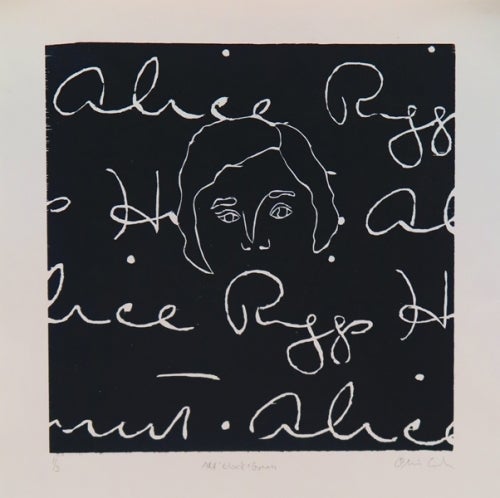
Olivia Carvalho, Mining the Archives of Alice Riggs Hunt (sashes and posters), relief prints, 2016.
Fine Arts professor Tara Cooper also describes the impact SC&A collections had on her students who created the exhibit: “One of the activities conducted with this class is going to the library and pulling out primary materials. A number of students were engaging with feminism as a topic, and that wasn’t part of the project. As a female instructor — it’s reassuring.”
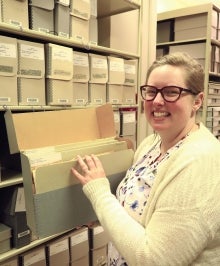
Jessica Blackwell with scrapbook materials from the Lady Aberdeen Collection.
Blackwell is continually inspired by the material in this and other women’s studies collections in the Library, and all that the women were able to accomplish in their lives. She sees further opportunities for student’s to interact with the collection, and for SC&A to showcase that student work. The Library continues to work on preserving the collection, ensuring it's available for future generations - two scrapbooks selected for their importance were recently fully restored and preserved by the Canadian Preservation Society.
Holmes also sees ongoing potential for Women’s Studies students to work with the collections; “I’m especially keen on closing the loop more effectively between our readings, local women’s textual and archival materials, and local women’s history. Ideally, I’d like to have students set out to interpret the collection, possibly even identifying other things to collect. I find that first-year students will rise to the occasion when there is public scholarship involved, and they are given challenging tasks that turn out to be meaningful to them.”
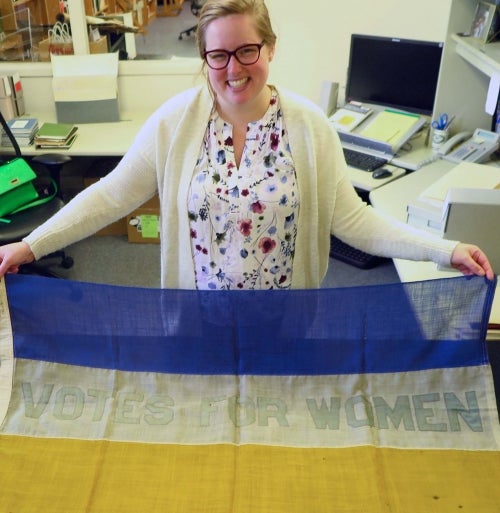
Librarian Jessica Blackwell with the same 'Votes for women' flag, circa 1910, pictured above.
SC&A is also keen to develop its gender and sexuality studies archives. They received the GLOW archives last year, and prospective donors are encouraged to contact Nick Richbell about donating their papers.
Learn more about Lady Aberdeen and the collection that bears her name through the Lady Aberdeen digital exhibit launched today, or visit Dana Porter Library on June 9 for International Archives Day. This year’s theme is “Archives, citizenship and interculturalism” and the event, running from 9am to 3pm, will feature materials that reflect the diverse cultural milieu of the region and Canada. This event is open to the public - as are all the materials housed in Special Collections & Archives.




